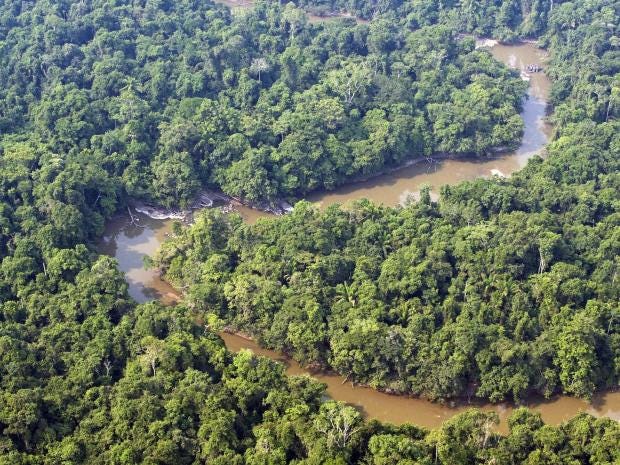https://www.independent.co.uk/news/science/climate-change-species-extinction-wildlife-animals-plants-risk-amazon-madagascar-galapagos-wwf-study-a8255541.html
Climate change could wipe out half of all plant and animal species from the Amazon rainforest by 2100, finds study
WWF report warns rising temperatures could be disastrous for world's most biodiverse areas
|
|
|
| 229 |
Click to follow
The Independent Online
The Independent Online

More than half of the wildlife in the world’s most biodiverse areas could face extinction by the end of the century if efforts are not stepped up to combat climate change, according to a new report.
The study, conducted by the World Wildlife Fund, University of East Anglia and the James Cook University, warns rising temperatures could have a disastrous impact on areas such as the Amazon, Galapagos islands and Madagascar, as well as European coasts and the Caribbean.
Researchers examined the impact of climate change on nearly 80,000 species of plants and animals in 35 of the world’s most naturally rich areas.
They explored three different climate change futures: a 2C rise in global temperatures – the threshold set out in the Paris Climate Agreement, a 3.2C rise – predicted for the end of the century, and a 4.5C increase – the forecast outcome if carbon emissions continue to rise unchecked.
READ MORE
The study suggests a global mean temperature rise of 4.5C would have a devastating impact on plants and animals, with the Amazon at risk of losing 69% of its plant species.
A temperature rise of 3.2C could lead to the loss of almost 50% of animal species in the Amazon.
Around 60% of all species would be at risk of local extinction in Madagascar – an island nation famed for its diverse wildlife – and up to 80% of mammals could be wiped out in the Miombo Woodlands in southern Africa.
Increased average temperatures and associated phenomena such as erratic weather would also have a catastrophic impact, the study warns, with significantly less rainfall in the Mediterranean, Madagascar and the the Cerrado-Pantanal in Argentina.
This could lead to pressure on the water supplies of African elephants, which need to drink around 150-300 litres of water a day.
Rising sea-levels could also submerge the breeding grounds of tigers in the Sundarbans, the largest mangrove forest in the world, situated on the coastline of India and Bangladesh.
Lead researcher Professor Rachel Warren, of the Tyndall Centre for Climate Change Research at UEA, said: “Our research quantifies the benefits of limiting global warming to 2°C for species in 35 of the world’s most wildlife-rich areas.
“We studied 80,000 species of plants, mammals, birds, reptiles and amphibians and found that 50% of species could be lost from these areas without climate policy.
“However, if global warming is limited to 2°C above pre-industrial levels, this could be reduced to 25%.
“Limiting warming to within 1.5°C was not explored, but would be expected to protect even more wildlife.”
The research was published ahead of Earth Hour, the world’s largest environmental event, in the journal Climatic Change.
World news in pictures
Tanya Steele, chief executive of WWF, said: “Within our children’s lifetime, places like the Amazon and Galapagos Islands could become unrecognisable, with half the species that live there wiped out by human-caused climate change.
“Around the world, beautiful iconic animals like Amur tigers or Javan rhinos are at risk of disappearing, as well as tens of thousands plants and smaller creatures that are the foundation of all life on earth.
“That is why this Earth Hour we are asking everyone to make a promise for the planet and make the everyday changes to protect our planet.”





沒有留言:
張貼留言